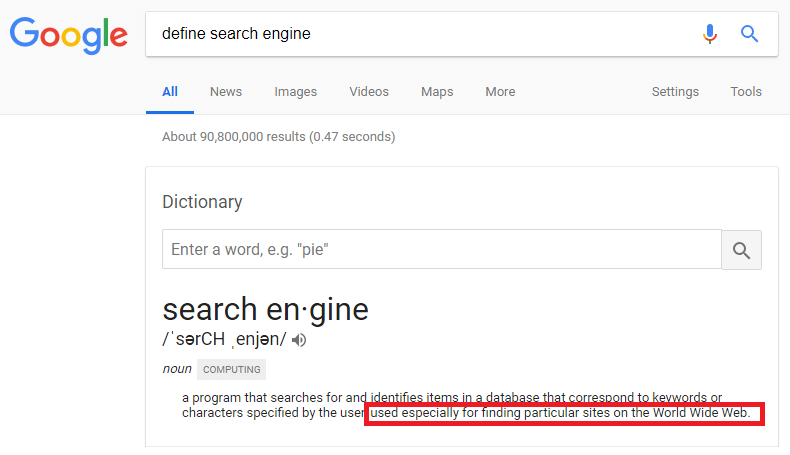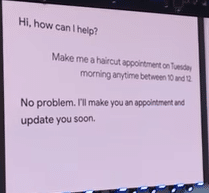Google announced a new service yesterday at Google I/O 2018 called Google Duplex and much like their announcement of Google Home / Assistant at Google I/O 2016 they reminded us that they have been planning and trying to build this service for over a decade. Google Duplex will allow consumers to make appointments and bookings with local businesses like hair stylists, restaurants, lawyers, etc… without the consumer themselves making the phone call. They said that it “all happens in the background” meaning the consumer doesn’t even hear the phone call happening just sees the end result.
Google Duplex combined with Featured Snippets, YouTube, AMP, Chrome, Android, Google Maps, Google Calendar, Google Wallet, and other Google Services effectively will give Google the ability to wipe out most of the open web, destroy the need for websites to exist, and swell their coffers with the immense windfall of profits that come from every business in the world paying to get phone calls and bookings directly from Google.
This also means Google is no longer a search engine. A search engine is most-often defined as a program that finds items in a database that match a keyword or keyphrase query and has become known as the single most used way for consumers to find a document on the world wide web that matches what they are looking for. Over time the definition has been bent a little from looking for websites to looking for specific entities. But with yesterday’s announcement of Google Duplex we have finally seen the death of Google the search engine and the rebirth of Google as a different kind of engine.

Search Engine’s are so successful because they mimic something the human brain does when a need is recognized as part of what is known as the Consumer Decision Making process. In this process immediately after someone has a need the brain performs what is known as “information search”. During this stage of the process the brain thinks about information it has absorbed into memory, consults family and trusted friends, and consults experts on how to best fulfill the need it now has. Google and other search engines (though increasingly fewer) fill the gap when a consumer doesn’t have any prior knowledge and doesn’t know anyone to turn to for help in making a decision. This is one reason position #1 in Google would always financially be more valuable to a company than followers/likes/subscribers on social media platforms, because it is a first order event – performing a search to gain knowledge. Most consumers for most queries perform this type of search first either on Google, Bing, Yahoo!, DuckDuckGo, Pinterest, or Amazon (for USA consumers) (though requesting input on Facebook, Twitter, and LinkedIn has increased in popularity) .
But with Google Duplex Google is no longer helping a consumer find a website, document, or entity on the web OR even showing them an answer they stole from another website – They are completing a task. This is incredibly different because it leaps over the “Information Search” phase of the consumer decision making process and moves into the “Purchase Decision” part of the process making and completing a purchase on behalf of the consumer without further involvement required.
If Google is doing this from a non-branded search like “hair salons near me” then it means ranking #1 is now the only acceptable position to rank in. In the example given at Google I/O the Google Duplex was triggered from a voice command to Google Assistant (using a non-branded command phrase), but that doesn’t mean this wouldn’t work from Google search either, think maybe a click to book button that triggers Duplex to book the appointment for you.
According to Yelp there are over 5,000 hair salons in the Dallas-Irving-Plano area (I checked the first 500 for accuracy) and if Google decides to rank 1 above all of them for Google Duplex phone calls that one salon will become very busy. That scenario is unlikely and it’s more likely that due to the abundant supply of hair salons and the massive demand for the top position, Google will be able to command a top price for every single hair salon’s leads from Google in smaller areas like neighborhoods. Their artificial intelligence system may also (read probably does but wasn’t announced) use the data given to them by the salons when they call to determine how busy a salon is and how much capacity they have for the data being discussed.
Eventually this could lead to a brand new type of advertising unit where Google’s A.I. system automatically helps salons reach capacity for a top price and then cuts off the flow of calls to that establishment for that particular day and delivers the calls to another salon similar to them and in the same area for a slightly lower price. This type of intelligent system would allow Google to practice Perfect Price Discrimination at an incredibly hyper-targeted level without the need for an advertising auction place.
This type of system would also work for restaurants, dentists, lawyers, mechanics / oil change places, nail salons, massage places, chiropractors, physical therapy clinics, facial treatment spas, and other similar places where making appointments or reservations is common.
This is not Google’s end goal. Remember how earlier I said that Google’s CEO Sundar Pichai keeps reminding us that they’ve been building towards these things for over a decade? Based on my theory that Google is attempting to build a predictive brain model in hopes of eventually storing human brains in computers to keep their founders alive forever (i.e. Larry Page and Sergey Brin) the ultimate goal for what Google is trying to build with Artificial Intelligence is what I call a Task Completion Engine.
Unlike a Search Engine, a Task Completion Engine has a very different goal. A task completion engine seeks to complete tasks for a consumer or to automatically predict what tasks a consumer is likely to want to complete and to help them in that regards.
In my talks over the years I’ve used an image for a man asleep sprawled out on a couch and told audiences that this guy is performing a search in the near-future according to Google to help drive home what this means. Eventually Google wants to get so good that they know what triggers you to want a hair appointment and will call to make that appointment for you and notify you only after it has been made. Like to eat out at new taco places on Fridays? Google’s Task Completion Engine will know that too and will make reservations for a new place or tell you when to leave and how to get to a new place that is trending so you get there before the crowd.
Think of a Task Completion Engine a little bit like Waze (note also owned by Google) but using every piece of data provided by you and millions like you and to complete more tasks than just driving to work or to a baseball game, to run your entire life and adapt as you grow and change or to help you grow and change.
Yesterday Google told us from stage that they have killed their search engine, it is now dead to them (which might explain the incredibly long amounts of time it’s taking to get pages updated in Google at the moment). They are now a Task Completion Engine and they’ll soon be joined in this new A.I. powered world by Facebook, Amazon, Apple, and Microsoft and maybe a few more new platforms that popup to challenge them as they all try to build the best Task Completion Engine for the Age of Automation, an era when humans are no longer ‘burdened’ with decision making or doing common menial daily tasks.
If you’re interested in the topic of Google becoming a Task Completion Engine here are some more resources.
- Why Google Purchased Nest Labs – Article, JoeYoungblood.com, January 17th 2014
- The Website Is Dead – Article, JoeYoungblood.com, November 23rd 2015
- What marketers need to know about Google assistant and Google Home – Article, SearchEngineLand.com, May 20th 2016
- Search in the Age of Automation – Video Presentation, Confluence Conference, 2016
- Success in the Age of Automation – Video Presentation, Interactive Strategies Conference, 2017
Here’s a hilarious parody of Google Duplex (and other Google I/O 2018 updates) to lighten the mood
UPDATE 6-9-2019:
While horsing around I found a brief article about a computer science project named Faete by Kristian Balog, a Professor of Computer Science as the University of Stavanger. In this brief post and the the linked research paper and poster Kristian explains what he calls a “Task-Completion Engine” which he says to think of like a mixture of Google, Excel, and Siri. The project received funding for research in the amount of approximately $460,000 USD in 2015 but appears to have stalled as Kristian’s website says he is currently on sabbatical and working at Google’s London office.
His ‘Task-Completion Engine’ is described like this “Our system will provide assistance for formulating information needs by engaging in a dialog with the user, will offer rich interaction with results, and will be able to learn from past user interactions. Put simply, it is about integrating features from Google, Excel, and SIRI into a single product.”
While that’s not completely Duplex because it lacks an A.I. component to make decisions, it is very very close to what Google announced at I/O 2019 which they called ‘Duplex for the Web’.
Project Faete
Project Faete Research Paper
Project Faete Poster


